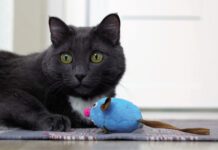Q: I have a 16-year-old domestic shorthaired cat I adopted from the humane society approximately 14 years ago. She is healthy, with no apparent diseases that we are aware of, and she is strictly an indoor cat.
Recently, she has begun yowling and wailing at all hours of the day and night. She often wakes me up very early in the morning with her vocalizing, and it is affecting my sleep. There have been no changes in her diet, litter box or in our household routine. Can you provide some insight into what may be causing this behavior?

A: Thank you for getting in touch with us, and I understand that this must be a concern for you and your family. Cats can be very vocal creatures (I know I certainly can!), and they are very good at getting their owners’ attention, often at inconvenient times of the day or night. There are a number of reasons that a cat may vocalize in this manner, ranging from normal to indicating disease, and I hope that I can provide some advice regarding the next steps to take in determining what is causing her to behave in this way.
The first thing to rule out is a disease. Urinary tract infections and/or stone formation in the urinary tract can be associated with pain and discomfort, and may cause cats to vocalize. In many of these cases, they may show other signs of illness in the urinary tract, such as frequent urination, vocalizing upon urination, blood in the urine or avoidance of the litter box. They may associate the act of urinating with pain, and therefore stay away from the place they normally urinate.
Certain diseases of the central nervous system, such as tumors or infections of the brain, can cause cats to behave abnormally. In many of these cases, cats will show some other sign of central nervous system problems, such as seizures, problems with balance, abnormal eye movements and/or lethargy/depression.
Another typical cause of excessive vocalization is hyperthyroidism, the most common endocrine (hormonal) problem in cats. In this condition, the thyroid gland, which is located in the neck (behind the larynx, or “voice box”) produces excessive thyroid hormone (thyroxine), a hormone that is important in a variety of organs in the body. High thyroxine levels can cause a cat to become hyperactive, have a ravenous appetite, lose weight despite eating more than usual, drink and urinating excessively, and to have an unkempt appearance. Owners of hyperthyroid cats often report that they vocalize excessively and at odd times of the day. In many cats with hyperthyroidism, the enlarged thyroid gland can be felt as a lump in the neck.
Another cause of excessive vocalization in cats may be age-associated deterioration of vision and/or hearing, leading to disorientation and confusion. Increasing age is also associated with an increased likelihood of dementia, which many veterinary behaviorists feel cats suffer from in a manner that is very similar to that seen in humans with age-associated dementia.
My best advice is for you to visit your cat’s veterinarian for a check-up as the first step in addressing this problem. He or she can help rule out medical causes of excessive vocalization, treat them if diagnosed, and/or make recommendations about how to address those causes not directly associated with a disease.
In most cases, cats with this problem can be managed well with appropriate diagnosis and treatment of underlying diseases, behavioral modification and/or anti-anxiety medications as guided by the veterinarian and/or veterinary behaviorist.
I understand that your kitty may be driving you bonkers right now, but please hang in there and seek veterinary assistance. I am sure that, with time, you will find a solution so that both you and your kitty can get some sleep!
—Sincerely, Elizabeth



